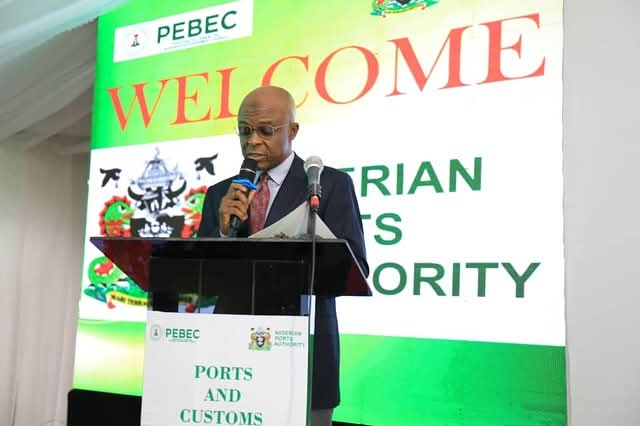The Nigerian Ports Authority (NPA) has confirmed that the National Single Window (NSW) project will be fully operational by the first quarter of 2026, as part of efforts to streamline port operations and boost trade efficiency.
NPA Managing Director, Dr. Abubakar Dantsoho, disclosed this during the inauguration of the Ports and Customs Efficiency Committee (PCEC) in Lagos on Thursday. The committee, set up by the Presidential Enabling Business Environment Council (PEBEC), includes key stakeholders such as the Nigeria Customs Service, terminal operators, shipping companies, truck owners, and freight forwarders.
Port Modernization Gets Presidential Approval
Dantsoho revealed that President Bola Tinubu has approved the modernization of Apapa and Tin Can Island Ports, which will involve deeper channels, expanded port space, and reinforced quay aprons.
“Tin Can Port was constructed 48 years ago, and Apapa Port is nearly a century old—yet no major rehabilitation has been done. This modernization is long overdue,” he said.
He acknowledged that the construction phase may disrupt port activities but assured stakeholders of regular consultations to minimize operational challenges.
Four Key Pillars for Port Efficiency
The NPA boss outlined four critical areas for repositioning Nigeria’s seaports:
- Infrastructure Upgrade – Modernization of Apapa and Tin Can Ports
- Equipment & Technology – Deployment of the Port Community System (PCS) to reduce paperwork
- Human Capacity Development – Enhanced training for pilots and technical staff
- Inter-Agency Collaboration – Strengthening partnerships for seamless operations
“The PCS is the backbone of the National Single Window. It will eliminate manual processes, cut costs, and boost revenue,” Dantsoho emphasized.
PEBEC Calls for Urgent Reforms to Reduce Cargo Delays
Princess Zahrah Mustapha Audu, Director-General of PEBEC, stressed that inefficiencies at Nigerian ports lead to missed economic opportunities, job losses, and delayed investments.
“This committee is not just another talk shop—it is action-driven. We must reduce cargo dwell time, eliminate duplicate documentation, and cut bureaucratic bottlenecks,” she stated.
She urged terminal operators to upgrade infrastructure, shipping companies to improve efficiency, and regulators to simplify processes, emphasizing that all stakeholders must take ownership of port reforms.
Next Steps: Implementation Over Dialogue
The PCEC is tasked with implementing overdue solutions rather than merely identifying problems. Audu noted that Nigeria loses billions daily due to port inefficiencies, calling for immediate, measurable improvements.
“This is about unlocking Nigeria’s maritime potential and driving economic growth. The time for action is now,” she declared.
With the National Single Window on track for 2026 and port modernization underway, Nigeria aims to compete with regional hubs like Togo and Ghana in maritime efficiency.

